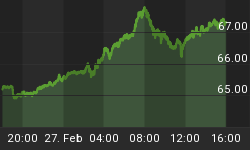Just three days ago, after looking at the prospect of bailing a string of distressed financial institution in the country, the government seemingly drew a line in the sand, and refused to bail out Lehman Brothers. The authorities clearly saw Lehman's demise as a trial balloon to see how the markets would react if the government stayed on the sidelines. That trial balloon quickly turned into the Hindenburg. Immediately reversing course, the Government has decided to go "all in" and bail out every institution with financial exposure to U.S. mortgages. Simply put, Americans will not be allowed to visibly suffer losses after the greatest asset bubble in U.S. history. But make no mistake, the losses are real and Americans will pay one way or another.
Moving beyond the guided munitions of selective bailouts, the Government is now trying the financial equivalent of carpet bombing (for AIG, Merrill Lynch, and especially Lehman Brothers, this gives new meaning to being a day late and a dollar short). To continue with the military analogies, Paulson's bazooka turned out to be a nuclear tipped ballistic missile.
By committing trillions of tax payer dollars (not the "hundreds of billions" that Paulson predicts), the plan will save commercial and investment banks from certain bankruptcy. In his statement today, Paulson made clear that Congress must pass new legislation to allow the Government to acquire even those loans too poorly collateralized to currently qualify for GSE or FHA absorption. The losses baked into these mortgage products, which Wall Street has been reluctant to even estimate, will now be borne wholly by taxpayers.
In his press conference, Paulson assured us that this plan was designed to safeguard our savings. But in typical government fashion, the plan will have the reverse effect as savings is wiped out through inflation. He also claims that the plan will safeguard home equity by keeping real estate prices high. Since when did high home prices become a strategic national priority? If the plan succeeds, the gains for home sellers will simply be matched by losses for homebuyers, who end up paying inflated prices, and taxpayers, who get stuck with the losses when those buyers default.
Paulson's distress and confusion was clearly evident when he fielded questions from reporters. The first asked Paulson to describe his fears regarding the probable economic consequences of government inaction. Paulson provided no answer and promptly exited stage right.
When the U.S. government owns all mortgages, the real estate market will be completely subject to political, rather than financial, concerns. Will foreclosures be outlawed? Will loan term easements and principal reductions become standard campaign issues?
While it is dizzying to predict how this plan will be implemented, it is fairly simple to foresee the macroeconomic consequences. The U.S. dollar will be shattered beyond repair. The government simply has no means to make good on the trillions of new liabilities. Interestingly, while both Paulson and President Bush acknowledge that the plan will put "significant amounts of taxpayer dollars on the line," they did not mention any tax increases. Given the politics, no such move is forthcoming. The printing press is their only solution.
The government has also decided to insure all money market funds, adding trillions more in unfunded liabilities to the Federal balance sheet in the blink of an eye. Of course, since bad real estate loans are not the only toxic assets on the balance sheets of financial institution, we will also need to absorb other classes of asset-backed securities, such as those backed by credit card debt and auto loans. So while the move ensures that depositors will not lose money, is does insure that the money itself will lose value. Is the trade-off really worth it? Washington thinks so.
Further, since I assume the plan will apply to all mortgage debt, U.S. taxpayers will also be on the hook to bail out foreign institutions that loaded up on the financial sludge. However, once the government takes them off the hook, do not expect them to re-invest the windfall back into other U.S. dollar denominated assets. This get-out-of-jail free card will likely scare them straight. The global mass exodus from the U.S. dollar and Treasury debt is about to begin: do not get caught in the stampede.
Although gold initially sold off as the apparent need for a financial safe haven ebbed, look for a spectacular rally to commence as its traditional role as an inflation hedge returns with a vengeance.
For a more in depth analysis of our financial problems and the inherent dangers they pose for the U.S. economy and U.S. dollar denominated investments, read Peter Schiff's book "Crash Proof: How to Profit from the Coming Economic Collapse." Click here to order a copy today.
More importantly, don't wait for reality to set in. Protect your wealth and preserve your purchasing power before it's too late. Discover the best way to buy gold at www.goldyoucanfold.com, download our free research report on the powerful case for investing in foreign equities available at www.researchreportone.com, and subscribe to our free, on-line investment newsletter at http://www.europac.net/newsletter/newsletter.asp.















